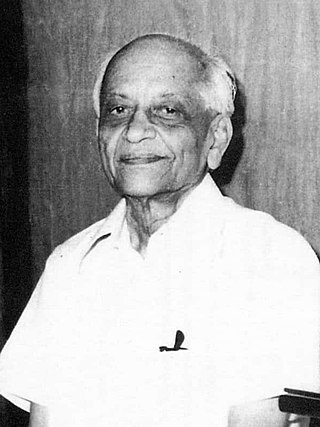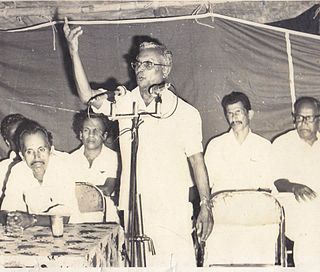
Elamkulam Manakkal Sankaran Namboodiripad, popularly known by his initials 'E. M. S.' was an Indian communist politician and theorist, who served as the first Chief Minister of Kerala in 1957–1959 and then again in 1967–1969. As a member of the Communist Party of India (CPI), he became the first non-Congress Chief Minister in the Indian republic. In 1964, he led a faction of the CPI that broke away to form the Communist Party of India (Marxist).

The Communist Party of India (Marxist) (abbreviated as CPI(M)) is a communist political party in India. It is the largest communist party in India in terms of membership and electoral seats, and one of the national parties of India. The party was founded through a splitting from the Communist Party of India in 1964 and it quickly became the dominant fraction.

The Communist Party of India (CPI) is the oldest communist party in India. The CPI was founded in modern-day Kanpur on 26 December 1925.

The Left Democratic Front (LDF) is an alliance of left-wing political parties in the state of Kerala, India. It is the current ruling political alliance of Kerala, since 2016. It is one of the two major political alliances in Kerala, the other being Indian National Congress-led United Democratic Front, each of which has been in power alternately for the last four decades. LDF has won the elections to the State Legislature of Kerala in the years 1980, 1987, 1996, 2006, 2016 and had a historic re-election in 2021 where an incumbent government was re-elected for first time in 40 years. LDF has won 6 out of 10 elections since the formation of the alliance in 1980. The alliance consists of CPI(M), CPI and various smaller parties.
The Party of Democratic Socialism (PDS) is a political party in West Bengal in India. The PDS was founded in February 2001 by former Communist Party of India (Marxist) leaders Saifuddin Choudhury and Samir Putatundu. The PDS was in opposition to the Left Front government in West Bengal.

Revolutionary Socialist Party (RSP) is a communist party in India. The party was founded on 19 March 1940 by Tridib Chaudhuri and has its roots in the Bengali liberation movement Anushilan Samiti and the Hindustan Socialist Republican Army.
Founded on 21 September, 1947 in Kozhikode, the Kerala Socialist Party (KSP) is a political party in India established under the leadership of Mathai Manjooran. Initially a small entity, the KSP gained significant public attention due to the efforts of its front-line leaders. The party became part of the coalition that formed the first democratically elected communist government in the world after San Marino. Within its first two-and-a-half decades, the KSP significantly influenced the Kerala state's post-independence political landscape.

The Liberation Struggle in Kerala (1958–59) was a period of anticommunist protest against the first elected state government in Kerala, India, which was led by E. M. S. Namboodiripad of the Communist Party of India. Organised opposition to the state government was spearheaded by the Syro-Malabar Church, the Nair Service Society, the Indian Union Muslim League, and Indian National Congress. The funding of the movement mostly came from outside of India, mobilised by the CIA and international Catholic organisations. Although termed a "liberation struggle", the campaign was largely peaceful by taking the form of statewide meetings and public demonstrations. Following mass protests in 1959, the Indian government finally bowed to pressure and dismissed Namboodiripad on 31 July 1959.
Varkala V. Radhakrishnan was an Indian politician and member of the 14th Lok Sabha. He also has served as the speaker of Kerala Legislative Assembly. He represented the Chirayinkil constituency of Kerala and was a member of the Communist Party of India (Marxist) political party. He represented the Varkala assembly constituency for five consecutive terms in Niyamasabha.

Shripad Amrit Dange was an Indian politician who was a founding member of the Communist Party of India (CPI) and a stalwart of Indian trade union movement. During the 20th century, Dange was arrested by the authorities for communist and trade union activities and was jailed for an overall period of 13 years.
Socialism in India is a political movement founded early in the 20th century, as a part of the broader movement to gain Indian independence from colonial rule. The movement grew quickly in popularity as it espoused the causes of India's farmers and labourers against the zamindars, the princely class and the landed gentry. After independence and until the early 1990s, socialism shaped some economic and social policies of the Indian government, although they mostly followed the principles of dirigisme. After this period, India moved towards a more market-based economy.
Communism in India has existed as a social or political ideology as well as a political movement since at least as early as the 1920s. In its early years, communist ideology was harshly suppressed through legal prohibitions and criminal prosecutions. Eventually, communist parties became ensconced in national party politics, sprouting several political offshoots.

Ezhu Kudikkal Imbichi Bava (1917–1995) was an Indian politician and a leader of the Communist Party of India (Marxist) from the municipality of Ponnani. He was member of the Rajya Sabha and the Lok Sabha, both the houses of Parliament.
Elamkulam Manakkal Sankaran Namboodiripad, popularly known as EMS, was an Indian communist politician and theorist, who served as the first Chief Minister of Kerala state in 1957–59 and then again in 1967–69. As a member of the Communist Party of India (CPI), he became the first non-Indian National Congress chief minister in the Indian republic. In 1964, he led a faction of the CPI that broke away to form the Communist Party of India (Marxist).

Kannur, formerly known in English as Cannanore, Arabic as Kannanur, and Portuguese as Cananor, is a city and a Municipal Corporation in North Malabar region, state of Kerala, India. It is the largest city in North Malabar, which is the northernmost region of Kerala. It is sometimes identified Kolathunadu, which was ruled by the Kolathiris. In the 12th and 13th centuries there was trade with Persia and Arabia.

The Kerala Legislative Assembly election of 1967 was held to constitute the fourth assembly in Kerala. This election, which was held after the 1965 one ended up in no government formation, resulted in the newly formed United Front alliance forming the government, while the INC, this time contesting alone was reduced to just 9 seats. E. M. S. Namboothiripad was sworn in as the Chief Minister on 6 March 1967.
United Front, known until 1971 as Mini Front (1970–1971) and as Maxi Front (1971–1979) thereafter, was a coalition of political parties in Kerala state, India, which was the ruling combine in the state from 1970 to 1979. The coalition was formed by five political parties immediately before the 1970 Kerala Legislative Assembly election. It saw the inclusion a few other parties in the following years.

In 1964, a major split occurred in the Communist Party of India. The split was the culmination of decades of tensions and factional infighting. When India became independent in 1947, differences arose of how to adapt to the new situation. As relations between the Nehru government and the Soviet Union improved, a faction that sought cooperation with the dominant Indian National Congress emerged within CPI. This tendency was led by S.A. Dange, whose role in the party hierarchy became increasingly controversial. When the Sino-Indian War broke out in 1962 Dange's opponents within CPI were jailed, but when they were released they sought to challenge his leadership. In 1964 the party was finally divided into two, with the left faction forming the Communist Party of India (Marxist). The split had a lot of regional variations. It also impacted other organizations, such as trade union and peasant movements. The split has been studied extensively by scholars, who have sought to analyze the various domestic and international factors involved.
Communists were actively involved in Indian independence movement through multiple series of protests, strikes and other activities. It was a part of revolutionary movement for Indian independence. Their main thrust was on organising peasants and working classes across India against the British and Indian capitalists and landlords.

The Communist Party of India (Marxist), Kerala or CPI(M) Kerala is the Kerala state wing of CPIM. It is responsible for organizing and coordinating the party's activities and campaigns within the state, as well as selecting candidates for local, state, and national elections. Currently, it is the governing party in the Kerala Legislative Assembly and has significant representation of the state in Rajya Sabha. The CPIM currently leads the LDF alliance.
















